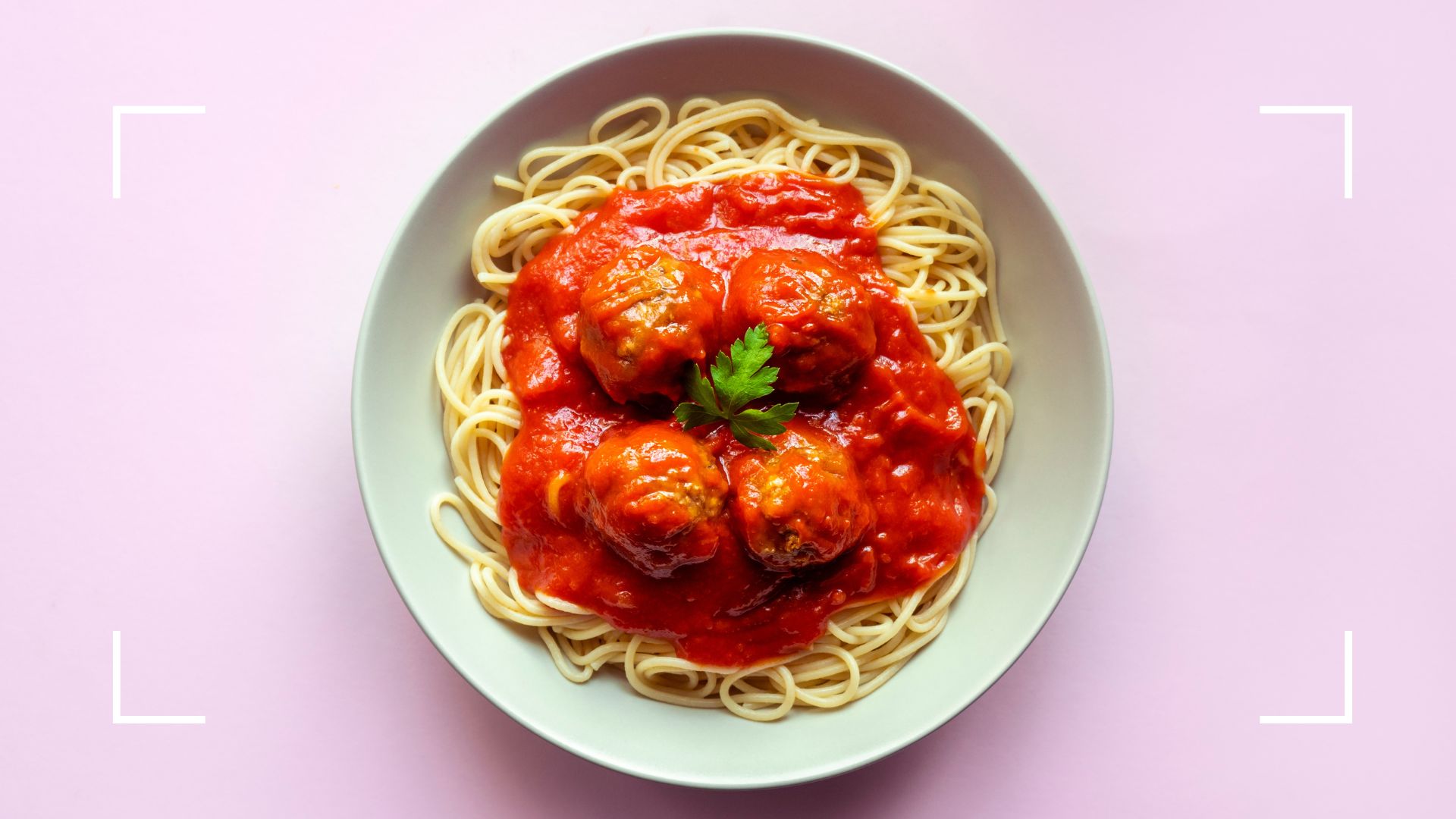Here's how to tell whether you're experiencing menopausal weight gain—and what to do about it
If menopausal weight gain is knocking your confidence, this is everything you need to know...


If you're experiencing menopausal weight gain, you're certainly not alone. It is a common side effect of this bodily change—and can be caused by factors including natural hormonal fluctuations and a slowing metabolism that comes with age.
Some may find that changes in their weight begin during the perimenopause, which often starts in your early 40s, but it can persist until the end of the menopause in your 50s.
The good news? Weight gain during the menopause is not inevitable and there are steps you can take, such as learning which diet is best for you going forward, to minimise its effects. We've called on the experts to explain exactly what is causing it and how it might also be related to increased bloating, as well as the best plan of action to take for healthy, sustainable weight loss.
Menopausal weight gain—why does it happen?

It could be down to imbalanced hormones, for example, too little progesterone and not enough estrogen—or vice versa. "Weight gain could also happen due to the thyroid not functioning optimally, which is very common during the period of menopause, and is often misdiagnosed or undertreated," explains clinical nutritionist and founder of JSHealth Vitamins, Jessica Sepel.
"Stress—which, as a result, causes high cortisol—could be another reason women gain weight around the stomach area," she adds. As well as being an appetite stimulant, one study from Ohio State University found, the cortisol hormone causes calories consumed during periods of high stress to manifest largely as fat round the middle.
"Additionally, hormones can affect insulin and glucose levels, which can, in turn, lead to weight gain."
Many women also experience a natural decline in muscle mass with age, which in turn slows down their metabolism, the same study found. This is one of the reasons why strength training and good protein intake during this period of life is essential, as it can slow down this process.
Sign up for the woman&home newsletter
Sign up to our free daily email for the latest royal and entertainment news, interesting opinion, expert advice on styling and beauty trends, and no-nonsense guides to the health and wellness questions you want answered.
One thing that is not responsible, however, is hormone replacement therapy (HRT). While the medication—prescribed to help with menopause symptoms—may promote fluid retention and bloating, it can actually increase your resting metabolic weight and may aid healthy weight management.
So how can you tell if your weight gain is down to menopause or something else? "The most important this is for women to seek professional advice to understand what could be going on," advises Sepel. "This may include getting a diagnosis for an imbalance in the thyroid or hormone levels, which could help explain what could be causing their weight gain."
As always with medical concerns, if you're unsure, seek the guidance of a doctor.
Can the menopause also cause bloating?
In short, the answer is yes. Regardless of fluctuations in your weight, it is possible that you may experience bloating during the perimenopause and menopause. "It may be as a result of imbalanced hormones," says Sepel. "This could include higher levels of estrogen."
This imbalance in particular can encourage water retention and intestinal gas. On top of this, reductions in bile—which keep the intestines lubricated—can trigger constipation, which may cause further bloating. What's more, as previously mentioned, HRT can trigger some bloating to take place.
But there are also non-menopause-related factors that could be playing a part in your bloating, Sepel adds. "It could be caused by diet and stress, which affect the digestive system," she warns.
You'll be pleased to hear that bloating should ease after the menopause though, once your ovaries stop producing estrogen and progesterone.
If you're in the midst of it, there are a number of steps you can take to reduce its effects. According to the NHS, this includes drinking plenty of water and herbal teas like peppermint, spearmint and fennel. It may also be helpful to eat smaller meals, more frequently and incorporate regular, gentle exercise into your daily routine to aid digestion—like going for a walk or doing some yoga for beginners.
Additionally, it can be useful to be aware of foods that could be making you 'gassy'—like cabbage, beans or lentils as well as processed, sugary, spicy or fatty foods. Consuming lots of fizzy drinks, alcohol or caffeine may likewise be worsening the problem. If you're worried about persistent bloating, it is important to seek the advice of a doctor, since it may be a symptom of something else.
What to do about menopausal weight gain

Start with medical help first, our expert says. "It can be wise to begin with health checks to understand what could be going on, especially hormone and thyroid checks and the relevant treatments," Sepel advises. This will help to rule out any menopause-related conditions that could be making you gain weight.
Then, if you want to lose weight, it's a case of making a couple of lifestyle changes. "Eat a wholesome balanced diet and incorporate enjoyable movement in your day," Sepel says.
Research from Maastricht University estimates that women require 200 fewer calories a day in their 50s than they did in their 30s and 40s. This is partly due to the natural slowing of the metabolism and a gradual decline of muscle mass, but also because typically those who are older tend to do less exercise. However, it can entirely differ person to person.
Naturally, learning how to eat less than you normally would is a good first step to making that reduction and any exercise, from walking for weight loss to HIIT training, can help to supplement this weight loss.
But as previously mentioned, building strength during this weight loss process is crucial. Lifting weights or using one of the best resistance bands during your strength training workout will help you burn calories while also preventing muscle loss over time.
Thirdly, it's also important to reduce general levels of stress. With those who go through high periods of stress throughout their day burning 104 less calories over 24-hours than those who don't, according to the Ohio State study, not combating sources of worry in your life could reverse any gains you make with your workout or nutrition plans.
Menopause diet—the foods to add
“A high intake of fiber will help you manage your weight as it encourages satiety, so you stay full and don't search for sugary snacks in-between meals," says Rob Hobson, registered nutritionist with Healthspan. "Also, make sure there is protein with every meal, since you do not want to lose weight at the expense of muscle mass which naturally deteriorates slowly as we age with a slight increase during the menopause."
Try and eat whole foods to support the gut and liver, like legumes, vegetables and fruit, says Sepel, who reveals: "Key nutrients during this time include vitamin B6, fish oil, magnesium and zinc for hormone support." This can be via supplementation if you can't get enough in your diet. She adds that limiting alcohol and sweet foods is also a good idea where possible, to reduce sugar cravings and ensure you're only meeting the recommended daily sugar intake.
There are some other things to consider too. According to the British Nutrition Foundation, women who are post-menopausal are also at an increased risk of cardiovascular disease, so keeping your heart healthy is imperative during and after this life stage. With this in mind, try to avoid saturated fats, and instead replace them with alternatives like olive and sunflower oils and spreads. Alongside this, aim to eat two portions of oily fish a week and keep salt to a minimum.
How long does menopause weight gain last?
Once again, weight gain during the menopause can be down to numerous things. "The hormonal changes of menopause may make you gain weight, but they alone don’t necessarily cause weight gain during this time, and aging, lifestyle and genetics are often factors," explains Dr Samantha Wild, women’s health lead at Bupa Health Clinics. "What's more, menopause impacts each woman differently—for example, symptoms like night sweats may leave her inactive and low on energy which could contribute to weight gain. Drinking more alcohol and eating the wrong foods to ‘self-medicate’ low mood may also add to this."
But remember, you're not alone. "Weight gain during menopause is common," notes Dr Laila Kaikavoosi, a GP, menopause specialist and founder of the Online Menopause Centre. "This is due to declining hormone levels and subsequent changes to metabolism and fat distribution. Women often find they gain fat around their abdomen and this can be distressing as it can also result in chronic diseases like diabetes. Replacing and balancing hormones at this time can certainly help, but this is also the perfect time for a woman to have a closer look at her nutrition, exercise and general lifestyle."
Menopause weight gain natural remedies
"Menopause is different for each woman and something that may have worked for a friend or family member may not necessarily work for you," says Dr Wild. "Speak to a doctor who will be able to recommend a treatment plan to help manage symptoms."
If you're wondering whether herbal remedies may help, proceed with caution. "There is no good evidence that any of the herbal remedies promoted for use in the menopause are beneficial, however this does not mean they do not work—there has just been little research in this area," explains Dr Wild. "Agnes Castus is said to improve some symptoms such as mood swings, tension and anxiety, while Black Cohosh and Red Clover may help with hot flushes. There is some evidence that St John's Wort may be of benefit for this too."
But it's important to seek medical advice first. "There are several natural remedies that can ease menopausal symptoms like hot flushes, sleep disturbance and muscle cramps," notes Dr Kaikavoosi. "There is no 'one size fits all' remedy and women should seek specific advice from menopause specialists and healthcare professionals who have an in-depth knowledge of women’s health and menopause. This is particularly important for those on medications for other conditions, as interactions and side effects should be weighed up before starting any new remedies."
There are other steps you can take too. "In Chinese medicine, menopause is viewed very much as a normal life transition with many women taking herbs, making dietary changes and having acupuncture as part of their daily lives," adds Asha Chong, a Five Element acupuncturist. "There has been lots of research into the effectiveness of acupuncture for easing menopausal symptoms. It’s also so important not to overwork and overdo, especially late into the evening. Avoid too much screen-time stimulation before bedtime, and try and limit stimulants such as refined sugar, coffee, alcohol and avoid spicy and fried foods. Stay well-hydrated and do gentle exercise."

Lauren is a freelance writer and editor with a decade of print and digital journalism experience. While she specialises in covering health and wellness topics - ranging from nutrition and fitness, to women’s health conditions and mental wellbeing - she has written across a diverse range of lifestyle topics, including fashion, beauty, interiors and travel.
In addition to writing for Woman & Home and sister title Homes & Gardens, Lauren's work has also been published by Women’s Health, The Times, Daily Telegraph, Elle, Cosmopolitan, The Guardian, Marie Claire, Body + Soul, Stylist, Glamour, Grazia, Red, Dazed Digital, Yahoo Life, The Sun’s Fabulous, Get The Gloss and Hello! among others.
-
 Cat Deeley's simple approach to self-care makes it so easy to feel good every single day
Cat Deeley's simple approach to self-care makes it so easy to feel good every single dayNo matter how little free time you might have
By Charlie Elizabeth Culverhouse Published
-
 What is ‘tile drenching’ and why is it the biggest design trend of 2025?
What is ‘tile drenching’ and why is it the biggest design trend of 2025?Expert insight and guidance on ways to bring this popular trend into your home, no matter your style
By Natasha Brinsmead Published
-
 5 sexperts share their secrets to better sex for mature women
5 sexperts share their secrets to better sex for mature womenThese women know how to put the va-va-voom back into the bedroom… possibly even the kitchen! Here's what we've learned from them
By Kim Willis Published
-
 Can menopause cause a loss of taste and smell? Plus, 6 other signs of menopause you might not expect
Can menopause cause a loss of taste and smell? Plus, 6 other signs of menopause you might not expectCan menopause cause a loss of taste and smell? It's more than just colds and flu that can change our tastebuds
By Emily Smith Published
-
 The health benefits of protein powder for women, according to a nutritionist
The health benefits of protein powder for women, according to a nutritionistWe've got the scoop on the benefits of protein powder when it comes to your health
By Lucy Gornall Published
-
 Wondering if you're postmenopausal? These are 9 ways your body changes post-menopause
Wondering if you're postmenopausal? These are 9 ways your body changes post-menopauseThese are the body changes you can expect if you're postmenopausal
By Lauren Clark Published
-
 Can you get pregnant during perimenopause? Here’s how your fertility changes from your 40s
Can you get pregnant during perimenopause? Here’s how your fertility changes from your 40sIf you’re wondering can you get pregnant during perimenopause, we’ve got the expert verdict
By Lauren Clark Published
-
 What are the main menopause symptoms? Find out the signs and when to see your doctor
What are the main menopause symptoms? Find out the signs and when to see your doctorA team of experts outline common menopause symptoms and how to deal with them
By Stacey Carter Published
-
 How to calm down hot flushes if you are going through the menopause
How to calm down hot flushes if you are going through the menopauseHot flushes are thought to be caused by hormonal fluctuations—these are the best ways to ease them...
By Lauren Hughes Published
-
 Menopause needs an image rebrand—let’s celebrate rather than fear it
Menopause needs an image rebrand—let’s celebrate rather than fear itA convincing argument on why menopause can be a positive stage of a woman's life
By Michelle Hather Published